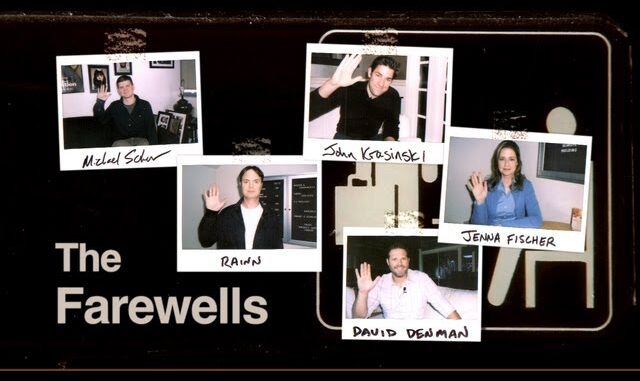
The fluorescent hum of the Wernham Hogg Community Centre auditorium usually whispered tales of potlucks and mildly contentious bingo nights. Tonight, however, it bore witness to something far more profound, a performance so uniquely, uncomfortably perfect it might as well have been staged for an audience of one: Michael Scott.
Michael, as we know, operates on a different frequency of social interaction. His world is a glorious, self-aggrandizing improv stage where every gaffe is a bit, every silence an invitation for a non-sequitur, and every genuine moment of discomfort is merely an opportunity for him to lean into the abyss with a wink and a “That’s what she said.” He thrives on the accidental, the unintentional, the person who tries so hard to be good, or cool, or profound, and ends up in a spectacular pile of self-inflicted cringe.
Enter Gary. Gary was auditioning for the prestigious (in Gary’s mind) role of Hamlet in the community theatre’s upcoming production. Gary had no discernable acting talent, but he possessed an abundance of unshakeable confidence, a feature Michael Scott would immediately recognize and perhaps, secretly, admire. He strode onto the makeshift stage, a man of fifty-odd years in an ill-fitting black turtleneck, carrying a prop skull he’d clearly brought from home.
The director, Mrs. Henderson – a woman whose face bore the permanent imprint of too many amateur dramatic disappointments – gestured vaguely. "Alright, Gary. 'To be or not to be.'"
Gary nodded sagely, as if contemplating the very fabric of existence. He held the skull aloft, almost bumping it on a low-hanging fluorescent light fixture. He opened his mouth, and then paused. A long, agonizing pause. It wasn't a dramatic pause; it was the pause of someone who had forgotten his lines.
Michael Scott, if present, would have already started chuckling, perhaps muttering, "Bold move, Gary. Really setting the mood."
Finally, Gary cleared his throat, a sound like a wet towel being wrung out. "To be… or… not to be. That is… the question." He delivered it less as a philosophical quandary and more as a series of hesitant questions he was asking the skull. Then came the twist. Gary, clearly having watched too many Hollywood blockbusters, decided to add "gravitas." He began to sing it. Not operatically, not even tunefully. He hummed a low, tuneless drone, punctuated by spoken words, as if the profound soliloquy was merely an accompanying track to his internal, struggling monologue.
"Whether 'tis nobler…" he hummed, then spoke, "in the mind to suffer…" another hum, then, "the slings and arrows…"
The hum continued, getting slightly off-key, morphing into a low moan as he wrestled with the next line. Mrs. Henderson’s face had gone from weary resignation to a kind of horrified fascination. Her assistant, a young man named Kevin who had been diligently taking notes, had simply stopped writing and was staring blankly at the stage, his pen hovering mid-air.
This was prime Michael Scott territory. The complete and utter misunderstanding of the assignment. The earnest effort that only magnified the ineptitude. The performer so lost in his own vision he was utterly oblivious to the silent screams of the audience.
Michael would be leaning forward now, eyes gleaming. He might even pull out his phone, pretending to check emails, but secretly recording the entire thing, thinking, This is gold. Pure, unadulterated gold. He'd be anticipating the inevitable train wreck, not with cruelty, but with the gleeful anticipation of a connoisseur of awkwardness.
Gary, meanwhile, had reached the climax of his musical-monologue hybrid. He dramatically threw the skull down (it bounced harmlessly), then knelt, palms pressed together like he was praying to the community center floorboards. "To sleep… perchance to dream…" he whispered, his voice cracking, the hum building to a warble that sounded suspiciously like a dying cat. "Ay, there's the rub!" he shrieked, suddenly standing bolt upright, his turtleneck riding up to reveal a patch of pale stomach.
The ensuing silence was a physical entity. Mrs. Henderson finally managed a strangled cough. Kevin slowly, deliberately, lowered his pen and picked up his backpack.
But Gary? Gary beamed. He truly, genuinely believed he had delivered a performance of raw, untamed brilliance. He bowed deeply, his chest puffed out, clearly expecting a thunderous ovation.
This, right here, was why it was perfect for Michael Scott. It wasn't just the failure; it was the unaware failure. The audacity of hope in the face of absolute ineptitude. Gary’s unshakeable belief in his own genius, despite overwhelming evidence to the contrary, mirrored Michael’s own inner world. Michael wouldn't mock Gary out of malice, but out of a profound, relatable sense of shared delusion. He’d probably offer Gary the lead role in the Dunder Mifflin Christmas play, certain that Gary's unique approach to drama would be "inspirational."
As Gary finally exited the stage, leaving behind a baffled director and a traumatized assistant, Michael would have clapped. Not a polite clap, but a slow, rhythmic, highly inappropriate clap, a wide grin splitting his face. "Genius!" he'd declare to no one in particular, perhaps wiping a tear of pure, unadulterated second-hand embarrassment and delight from his eye. "That, my friends, is entertainment." For Michael Scott, an audition so awkward it turned Hamlet into a tortured karaoke session wasn't just a failure; it was a masterpiece of misjudgment, a symphony of cringe, and perfectly, hilariously, human.